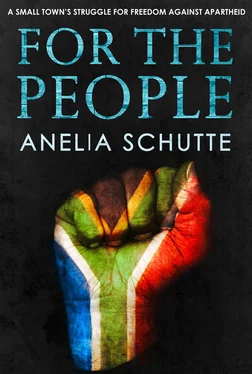‘We had to make sure the economy kept going by supplying workers, and seeing that it was done on a proper, coordinated basis,’ he says. ‘Otherwise, if you had to just throw open the doors, you can imagine what kind of influx it would have caused.’
And, he says, you couldn’t allow those people to come in without providing the necessary services for them. But, in a catch-22 situation, you couldn’t budget properly for those services when the censuses weren’t giving a true reflection of the size of the population. And the people who were in Knysna illegally avoided getting polled in an effort not to get caught.
‘You do a census,’ he says, ‘and the census says there are a thousand people. But in reality there are two thousand. Now you work according to the numbers and build a school. Then they say the school is too small. It’s always too small.’
He tells me it was impossible to keep everyone happy.
‘Say I let people come in,’ says Oom Piet. ‘Then they’ll probably come to me later and say we now need church premises. Then I say OK, fine, we’ll make a plan. Now you give them premises for a church. And tomorrow they come and say but that’s an Anglican Church. Now we need this church and another church and another church. If you make one concession, you really need to do your homework. And that’s where things got messy.’
There was never enough money, he says. Funds from the provincial government were extremely limited, and because of Knysna’s hilly terrain, any building work and infrastructure cost considerably more than in most other places in the region.
On the positive side, he says he feels like he meant something to the people.
‘You were at once a teacher, a social worker, a magistrate. You solved problems, you served people with knowledge.’
But he realises those people might not have liked everything he did. As well as controlling the influx of black people into the area, the Bantu Administration was responsible for removing squatters from white-owned land – two jobs that couldn’t have made him popular with the black community.
‘It’s like traffic police,’ he says. ‘We all agree there have to be traffic police on the roads. But they have to catch other people, not you. And that’s how it is. As long as the traffic cop catches other people, it’s hunky-dory. And who likes the traffic cop? We’re all friendly when we see him. But when he walks away, we say, “That’s the last job I’d want.”’
Конец ознакомительного фрагмента.
Текст предоставлен ООО «ЛитРес».
Прочитайте эту книгу целиком, купив полную легальную версию на ЛитРес.
Безопасно оплатить книгу можно банковской картой Visa, MasterCard, Maestro, со счета мобильного телефона, с платежного терминала, в салоне МТС или Связной, через PayPal, WebMoney, Яндекс.Деньги, QIWI Кошелек, бонусными картами или другим удобным Вам способом.












